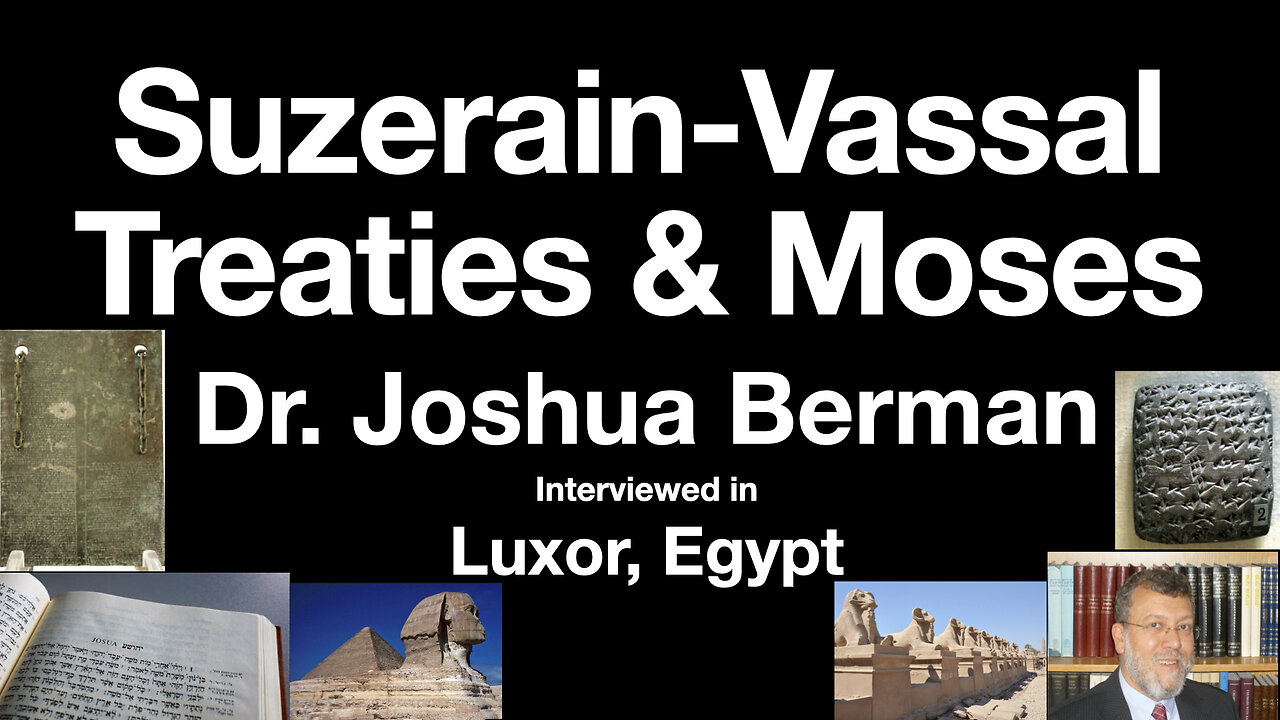Premium Only Content

Suzerain-Vassal Treaties & the Books of Moses or Pentateuch: Dr. Joshua Berman, Bar-Ilan University
"Suzerain-Vassal Treaties & the Books of Moses or Pentateuch" is an interview with Jewish scholar Dr. Joshua Berman, professor of Hebrew Bible at Bar-Ilan University in Israel. Dr. Berman, a graduate of both Princeton University and Bar-Ilan University, discusses the powerful archaeological evidence from the suzerain-vassal treaty format in the Books of Moses--Genesis, Exodus, Leviticus, Numbers, and Deuteronomy-for the authorship of the Pentateuch by its traditionally recognized author-Moses-in the traditional time period, the Bronze Age.
The interview was conducted by Dr. Thomas Ross during a faculty tour of Egypt led by Egyptologist and Christian scholar Dr. James Hoffmeier in conjunction with Tuktu Tours. Scholars such as Kenneth Kitchen (On the Reliability of the Old Testament), James Hoffmeier (The Archaeology of the Bible), and Meredith Kline (Treaty of the Great King: The Covenant Structure of Deuteronomy) are also quoted on the topic.
The Bible presents the true God-the God of Israel-as the great King, the suzerain, and Israel as the vassal, or subordinate, who needs to obey the great King or suzerain because the suzerain has delivered or saved the vassal. By God's saving Israel from Egypt, He became the nation's king, and Israel become God's vassal.
Approximately one-hundred treaties and law codes have been discovered and translated of comparative value to the Sinai covenant the Bible declares that God gave to Moses. The covenants from the third millennium BC differ in structure from those of the second, and those of the second differ in structure from those of the first. Exodus 20-24 and Deuteronomy are written in a covenant structure employed in the second half of the second millennium BC-the Biblical time of Moses. This suzerain-vassal treaty format was consciously followed in both Exodus and Deuteronomy. Treaties from a thousand years later-when skeptics must date the Pentateuch if they wish to explain away its predictive prophecies-are radically different in format” from those of the time of Moses, in which the Sinai covenant was composed. The Biblical text shares intimate distinctions with the late-second-millennium documents not found in the first-millennium.
Dr. Kenneth Kitchen notes:
The particular and special form of covenant evidenced by Exodus-Leviticus and in Deuteronomy (and mirrored in Josh. 24) could not possibly have been reinvented even in the fourteenth/thirteenth centuries by a runaway rabble of brick-making slaves under some uncouth leader no more educated than themselves. The formal agreeing, formatting, and issuing of treaty documents belongs to governments and (in antiquity) to royal courts. Private citizens had no part in, and no firsthand knowledge of, such arcane, diplomatic procedures. Their only role was to hear the content of a treaty (if they were vassals of a suzerain-overlord), and obey it through their own ruler. So also today, treaties are agreed to by heads of state, and implemented by them; and any bills are picked up by the long-suffering taxpayers with never a sight of the original interstate document responsible for the cost.
So, how come documents such as Exodus-Leviticus and Deuteronomy just happen to embody very closely the framework and order and much of the nature of the contents of such treaties and law collections established by kings and their scribal staffs at court in their respective capital cities in the late second millennium? This is socially and conceptually a million miles away from serfs struggling to build ... Pi-Ramesse (and Pithom) in the sweaty, earthy brickfields of Exodus 1:11–14 and 5:6–20! No Hebrew there could know of, or would care about, such high-level diplomatic abstractions.
Even a runaway rabble inevitably needs a leader. To exploit such concepts and formats for his people’s use at that time, the Hebrews’ leader would necessarily had to have been in a position to know of such documents at first hand—either because he knew people who shared such information with him or because he was himself involved with such documents. There is no other option.
In short, to explain what exists in our Hebrew documents we need a Hebrew leader who had had experience of life at the Egyptian court, mainly in the East Delta (hence at Pi-Ramesse), including knowledge of treaty-type documents and their format, as well as of traditional Semitic legal/social usage more familiar to his own folk. In other words, somebody distressingly like that old “hero” of biblical tradition, Moses, is badly needed at this point, to make any sense of the situation as we have it. ... On the basis of the series of features in Exodus to Deuteronomy that belong to the late second millennium and not later, there is, again, no other viable option.
Since the Pentateuch was written by Moses, the Bible must be true, for the Pentateuch contains specific predictive prophecies that were fulfilled many centuries later. Only God can predict the future in this way!
-
 1:00:36
1:00:36
PMG
23 hours ago $5.76 earned"Santa Trump is Giving Us Hope - But Will Johnson Stand Strong?"
59.1K9 -
 54:30
54:30
LFA TV
1 day agoThe German Strongman’s Arrival Is Imminent | Trumpet Daily 12.18.24 7PM EST
48.5K2 -
 2:04:11
2:04:11
Melonie Mac
7 hours agoGo Boom Live Ep 32! Soul Reaver Remastered!
40K8 -
 39:11
39:11
Sarah Westall
4 hours agoDigital Slavery and Playing with Fire: Money, Banking, and the Federal Reserve w/ Tom DiLorenzo
50.3K4 -
 1:38:38
1:38:38
2 MIKES LIVE
9 hours ago2 MIKES LIVE #157 ILLEGALS, PROTESTORS AND DRONES!
33.7K1 -
 1:01:03
1:01:03
LFA TV
1 day agoTHE LATEST SPENDING BILL IS AN ABOMINATION! | UNGOVERNED 12.18.24 5pm EST
36.9K36 -
 1:43:34
1:43:34
Redacted News
8 hours agoBREAKING! WARMONGERS PUSHING TRUMP TO LAUNCH PRE-EMPTIVE WAR WITH IRAN | Redacted News
146K264 -
 1:00:26
1:00:26
Candace Show Podcast
8 hours agoPiers Morgan x Candace Owens | Candace Ep 123
89.2K248 -
 2:06:51
2:06:51
Darkhorse Podcast
11 hours agoFollow the White Rabbit(s): The 256th Evolutionary Lens with Bret Weinstein and Heather Heying
63.3K27 -
 3:08:08
3:08:08
Scammer Payback
8 hours agoCalling Scammer Live
37.3K3